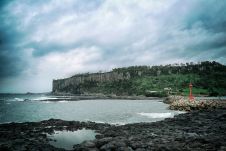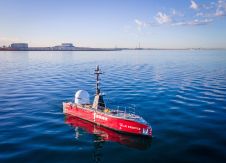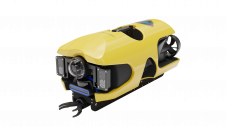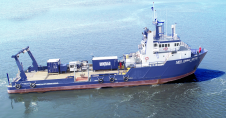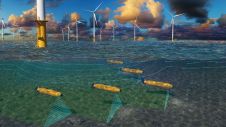Responsible Coastal Zone Management
Hydro International Interviews Ron Furness
The coastal zone is immensely important for humankind, marine and coastal spatial planning is a vital tool for planning and preserving the world’s coasts. Ron Furness, is a nautical cartographer, who has for a long time seen the potential added value of utilising GIS for the coastal zone and became one of the founding fathers of the CoastGIS conference series, being held this year for the tenth time in Ostend, Belgium. He speaks to Hydro International about the start of the series and the importance of geospatial data describing the edge of land and sea. Can you tell us how CoastGIS started?
In 1995, Darius Bartlett from University College, Cork and David Green from the University of Aberdeen and myself started what was to be a small conference on GIS for coastal zone management. It was the beginning of the use of GIS in scientific and research work on the coast, and we thought it was extremely important to exchange ideas and views: everybody generally agreed that the coast needed special attention but there seemed little opportunity to bring together everyone who had an interest in the coast. This first CoastGIS, then held at the University of Cork in Ireland, was meant to be a ‘one-off', but sixteen years later, the topic has grown in importance and this year the tenth conference will be held in Ostend, Belgium. Our aim has always been to establish a further appreciation of the coast and its importance to humankind, and together emphasise GIS as a tool to exploit geographic data to aid better decision-making on the coast.
Why is there still such an interest?
A large percentage of the world's population lives on the coast, so the importance of good decision-making underpinning the preservation and planning in order to establish and maintain safe coastal environments will increase. As long as there are buildings and other infrastructural projects planned without properly taking the environment and coastal vulnerability into account, the level of interest should grow! One of the enduring virtues of the CoastGIS series has always been that it has proven to be a good networking tool, has established a core network of experts from differing backgrounds and has given views of the coast and therefore facilitated in answering questions posed on GIS, standards, etc.
What are the hottest topics in coastal zone management?
I would like to start off with what we have already covered throughout the years: I don't think the technology is a particularly hot issue anymore either for GIS or data collection. We have come a long way from limited storage and graphics capacity to modern day computers with the ability to potentially store terabytes of data on a standalone computer and much and much more on servers. The graphics capabilities of GIS and charts and special purpose mapping has also come a long way. So, I think, computer and GIS technology are well ahead of the game. The biggest question now perhaps remains the perennial one: how best to make full use of all possibilities to make GIS the basic tool underpinning modern, improved decision making. In order to do so, we need to create a greater awareness or willingness to bring a myriad of different datasets together. The drive to achieve spatial data infrastructures remains the hottest issue, I think. This will be one focus for the CoastGIS meeting in Ostend.
Why aren't we there yet? Are professionals not seeing the possibilities?
Well, yes, they do, sort of! However, the brakes present on such necessary developments, now mainly seem to be institutional. Despite significant initiatives like INSPIRE in Europe, there are still many institutes and organisations doing their work at a micro level, thereby not bringing everything together for the benefit of broader society. We still have to overcome notions of secrecy about or protectiveness towards data, for example. Local, regional and national interests of agencies should become secondary to the bigger significant interest of protecting and managing the coast. I am encouraged to see many such initiatives but continue to feel that we could make more progress by improving co-ordination.
Who should take the lead in overcoming this?
This is an interesting point and not an easy one to answer. The moment larger institutions sit down together to talk about issues such as the obligatory sharing of data and developing standards, as specialists, they almost naturally turn towards their own specialisation, sometimes not seeing the larger picture. And the moment they do, there's the next problem. When standards are developed, they often become very rigid, making it difficult to implement new technical developments. You need a certain level of rigidity to establish interoperability, but finding that balance is difficult. Interoperability is something I believe the military does very well. The military does not tend to see land and sea and intertidal areas as separate geographical zones for effectively operating in an area. In my limited understanding they see an area as a ‘theatre of operations'. I suggest this approach would also better serve coastal zone planners. It follows that better decisions need to come from regional approaches to data collection, perhaps with some sort of national data champion - a sort of National Geospatial Ombudsman - a role where it is justified that data collection takes place at the more regional or even local level with an eye on its future potential uses and its metadata. There appears to be more willingness to use indexes and the web to make data more readily available but getting hold of existing data still seems to be overly difficult.
Are there more ‘hot topics' in coastal zone management and marine spatial planning?
Perhaps the hottest topic is the perennial matter of data existence and availability and the general lack of a national will to fund data activities on a ‘might be useful' basis. It is not cheap to collect coastal data for some generally defined purpose so we naturally tend to see data collected on a project by project basis. Thus the immediate issue for the coastal planner becomes one of finding out what data is available, can it be accessed and incorporated into the more national requirement and can it be used satisfactorily for some purpose that it might not have been collected for? Rapid response is the order of the day in the face of any disaster, whether it is one caused by a failure of planning or construction or whether it is some unforeseen catastrophe such as the recent tragedies experienced by Japan. Institutional barriers, where they exist, seem to melt in the face of such exigencies but it would be better if they did not exist in the first place. Imagine a project to protect fish habitat in a bay and some major oil leak many miles away with potential impact. Issues of data availability and possible impact scenarios become all important. Only data descriptions, availability and openness can avoid delays in assisting the decision makers on the spot and GIS, properly prepared and designed inter-organisationally, seems to be able to offer what is required. I cannot get out of my head the Boy Scout motto: 'Be Prepared!'
What should manufacturers in geomatics focus on with regard to their products for coastal zone management?
Of course the most important question to answer is: what are the customers, the professionals who operate the products, concerned about? What do they want to achieve? For one thing: actuality, they want to know what exists in reality, what data is already available and how best to fit in existing data immediately as part of the overall operational requirement. Another thing is climate change and its impact on the coast, how can the resources of the coast best be handled in order to prevent damage to coastal environments and the destruction of marine habitats, beaches and coastal installations. Manufacturers should take these scenarios into account when designing or developing new systems. Particularly the advent of dynamic data capabilities can be factored in with the use of simulation to aid in arguing the case for funding of data collection. The customer wants to be able to make well-balanced decisions on the products he uses.
Is there a message you want to share with Hydro International readers?
I am aware that the coastal zone has an impact on many people who in turn have an impact on the zone. However we define it, it is a fact that the great majority of the world's population lives near or even in the zone. Yet we, speaking most generally, continue to abuse and despoil the zone ultimately to threaten our very existence on the planet. While many readers might well say that much of what Furness is on about is already being done, I argue that we still face challenges and that the pace of such efforts and their effectiveness needs constant focus if we are to manage our coastal zones better.

Value staying current with hydrography?
Stay on the map with our expertly curated newsletters.
We provide educational insights, industry updates, and inspiring stories from the world of hydrography to help you learn, grow, and navigate your field with confidence. Don't miss out - subscribe today and ensure you're always informed, educated, and inspired by the latest in hydrographic technology and research.
Choose your newsletter(s)












